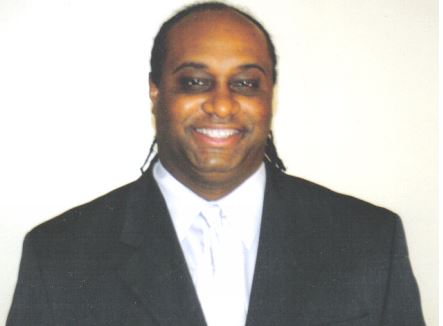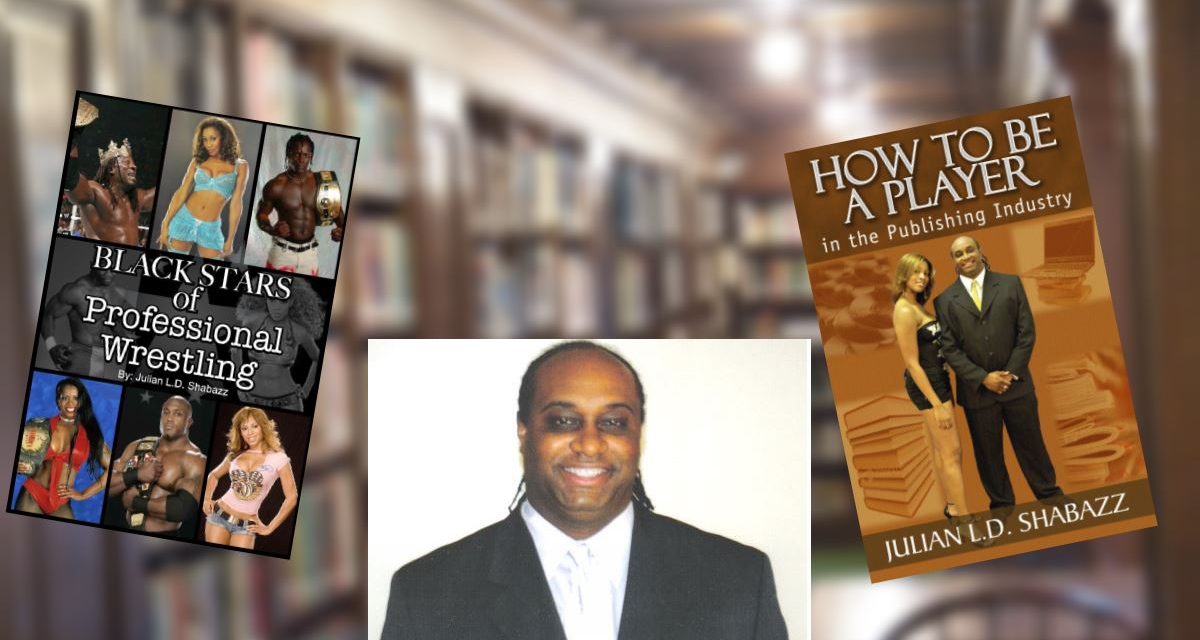Julian L.D. Shabazz, better known to pro wrestling fans as the author of Black Stars of Professional Wrestling, died on June 14, 2020, at the age of 52.
According to his obituary, in addition to being an author, Shabazz also worked as “a motivational speaker, rap artist, professor and librarian.” Residing in Clinton, South Carolina, Shabazz had also “earned a master’s degree in parks and recreation administration” and “was pursuing a doctorate of education in sports management.” Shabazz’s cause of death was not mentioned. He is “survived by four children Rassoull, Cleopatra, Nigel and Khalil, his mother Mary and brother David.”
In an interview on SportsTalk with Glenn Harris, promoting his book on May 26, 2000, Shabazz says he was motivated to write and self-publish Black Stars of Professional Wrestling after the passing of African American wrestlers Bobo Brazil (Houston Harris) and Junkyard Dog (Sylvester Ritter) in 1998. He wanted to ensure that their stories and those of their fellow African American colleagues were chronicled. The book, first released in 1999 but currently in its third edition, can be seen as an encyclopedic guide to all the African Americans who have stepped into the squared circle going back to the 19th century.

Julian L. D. Shabazz
Sheldon Goldberg, who owns New England Championship Wrestling and previously published a newsletter called Mat Marketplace, met Shabazz when the author reached out to him to help publicize his book.
“(Julian was) quite an impressive guy, quite a scholar,” remarked Goldberg in a phone interview with slamwrestling.net. “He’s written about a dozen books or so. He even wrote (comedian) Rudy Ray Moore’s only biography (with his brother David L. Shabazz). And he had a record company called Awesome Records.”
Added Goldberg, “He was a scholar and a gentleman. And to have written a book like that, it was very much ahead of its time. Wrestling was still sort of not really hip to appreciating its history.”
Evan Ginzburg, the Associate Producer for The Wrestler and 350 Days, also met Shabazz through his own newsletter, Wrestling – Then & Now.
“Shabazz got in touch with me and picked my brain a bit,” shared Ginzburg via Facebook Messenger. “I was impressed by his knowledge, passion and drive to research what would become his book, Black Stars of Professional Wrestling. He documented many wrestlers who had been wrongfully long forgotten and thus did a service to the business. I’m saddened by his passing.”
Author and pro wrestling historian John Cosper says he never met Shabazz, but he utilized Shabazz’s book while conducting research for his own book, The Original Black Panther: The Life & Legacy of Jim Mitchell.
“Julian was (I think) the first guy to really try to catalog all the African American professional wrestlers past and present,” commented Cosper via Facebook Messenger. “It was a huge undertaking, and it brought a lot of names to light in the modern era that hadn’t been in print for years. He laid a lot of ground work for future historians to build on.”
Mike Mooneyham, a pro wrestling columnist for The Post and Courier, paid tribute to the passing of his friend on his personal Facebook page but added to Slam via Facebook Messenger: “I do know that Julian was a beloved teacher and mentor to many at Benedict College, a historically black institution in Columbia (South Carolina), where his students absolutely revered him. He seemed to be ‘everyone’s favorite professor.’ I read a comment from one of his former students that articulated his relationship with them: ‘He (Shabazz) taught me to dream and look beyond my current circumstances. He was a father to the fatherless. Even after I graduated, we remained in contact and spoke often. He was always encouraging me and challenging me not to become complacent and live unapologetically.’ He obviously poured much into his students.”
Upon news of his passing, Shabazz’s personal Facebook page was flooded with heartfelt messages of condolences from colleagues, friends and students. His contributions to shining a light on African Americans pro wrestlers have also been resonating with those African Americans currently involved in the pro wrestling industry.
“Julian’s book is important to pro wrestling especially now, because it’s important for black wrestlers to be recognized for their hard work and contributions to the business,” declared David Joseph, a freelance broadcaster and contributor for Daily DDT, in an email to Slam. “I feel like black wrestlers do not get highlighted enough by a white dominated industry except on Black History month. That needs to change!”
“In a lot of his (Shabazz’s) interviews, he said that he decided to take a completely unbiased approach to documenting the lives of these wrestlers,” observed Chris Bournea, the writer and director of the documentary Lady Wrestler: The Amazing, Untold Story of African-American Women in the Ring, in a phone interview with Slam. “He didn’t want to get into the racial issues so much. He just merely wanted to give wrestling fans and people who are interested in history, basically an encyclopedia of wrestling from an African American perspective. So that’s very, very important because a lot of people, myself included until I met the women that I interviewed for my documentary didn’t know that a lot of these wrestlers existed, and didn’t know a lot of their accomplishments. So, I think this book is especially relevant now when people are starting to realize the importance that African Americans have contributed to this country (the United States).”
“From what I understand, people connected with it (Shabazz’s book) so strongly because it’s rare – if ever – that Black history in wrestling is acknowledged in a comprehensive guide,” offered Joe Anthony Myrick, editor at Daily DDT, in an email to Slam Wrestling. “Black people are no strangers to not knowing about our true roots in history, and our history in wrestling either gets overlooked, unknown or ignored altogether. I’m certainly not aware of any other book that analyzes deeply into the roots of Black wrestling and to see Julian do just that is impressive.”
David Shabazz, Julian’s brother, posted the details for Julian’s memorial service on his Facebook page. The service will be held on June 26, 2020 at 11:00 a.m. at Palmer’s Memorial Chapel located at 1200 Fontaine Road, Columbia, SC. “My mother and I welcome all of Julian’s coworkers, colleagues, former students and friends,” he posted. “Space is limited due to COVID-19 safety guidelines. Everyone must wear a mask.”
EDITOR’S NOTE: Watch for our group discussion about race in pro wrestling down the road, inspired by Julian L.D. Shabazz. While you wait, check out Julian on YouTube:

